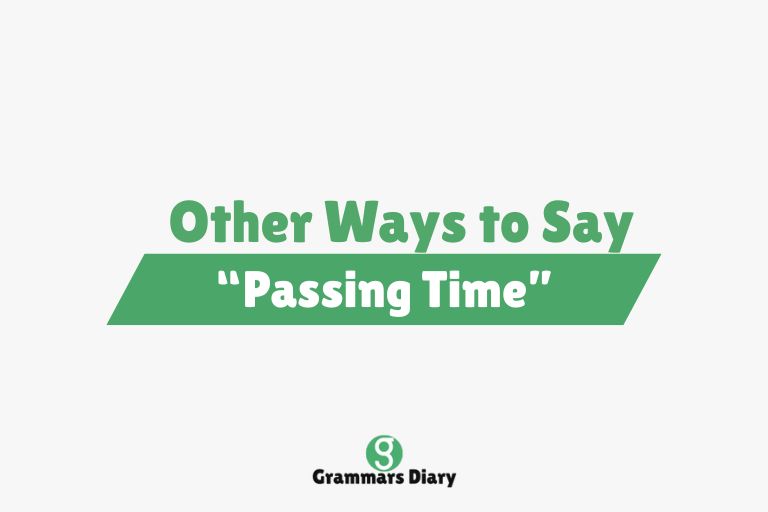“Passing time” is a widely used phrase that refers to the act of engaging in activities or simply letting time go by, often while waiting for something more important to happen or during periods of idleness. Whether you’re sitting at an airport, waiting for a meeting to begin, or spending a lazy Sunday afternoon, we often find ourselves looking for ways to make time feel shorter or more meaningful.
However, there’s a rich vocabulary of expressions that can be used in place of “passing time,” each with its own distinct connotation depending on the tone, setting, or intention behind the activity. In this post, we’ll take a deeper look at sixteen alternative ways to express this idea—ranging from casual phrases to more descriptive or literary terms—so you can add variety, nuance, and richness to your writing or everyday speech.
Other Ways to Say “Passing Time”
1. Killing Time
Example: “I was just killing time at the café until my train arrived.”
Meaning: To engage in idle activities simply to make time go by. This expression implies that the activity is not particularly important or meaningful but serves the purpose of occupying oneself temporarily.
Usage: Common in informal conversations or situations where someone is waiting and wants to express that the activity isn’t of real consequence.
2. Biding One’s Time
Example: “He’s just biding his time until a better opportunity comes along.”
Meaning: To wait patiently for a suitable moment, often with the intention of taking action later. This phrase implies strategy, patience, and sometimes restraint.
Usage: Often used in more reflective or strategic contexts, whether in literature, business, or personal storytelling.
3. Whiling Away the Time
Example: “She whiled away the afternoon by reading a novel in the garden.”
Meaning: To spend time in a relaxed and pleasant way. This phrase has a gentle, almost poetic tone that conveys contentment in how the time was spent.
Usage: Ideal for writing or speech that wants to capture a peaceful, leisurely passage of time.
4. Filling the Time
Example: “He filled the time between meetings with some light reading.”
Meaning: To occupy time, often to stay busy or avoid boredom. This expression tends to focus on practicality and the act of finding something to do.
Usage: Common in both formal and casual settings, especially when time needs to be managed productively.
5. Spending Time
Example: “We spent time walking through the old town, enjoying the scenery.”
Meaning: To use time doing something, often with the implication of being present or engaged in the activity.
Usage: Versatile and widely applicable in all contexts, from casual conversations to formal descriptions.
6. Passing the Hours
Example: “He passed the hours sketching in his notebook as the sun set.”
Meaning: To spend a length of time doing something, often used to imply a longer, drawn-out period of time.
Usage: More often used in descriptive or narrative writing to evoke a sense of time flowing slowly or peacefully.
7. Idling Away
Example: “They idled away the summer days by the riverbank.”
Meaning: To spend time doing very little or nothing at all. This phrase suggests relaxation, leisure, or a lack of urgency.
Usage: Best suited for creative writing or reflective conversations where the mood is calm and unhurried.
8. Wasting Time
Example: “I felt like I was just wasting time watching random videos online.”
Meaning: To use time inefficiently or unproductively. This phrase carries a negative tone, often associated with regret or missed opportunity.
Usage: Appropriate when expressing dissatisfaction with how time was used, whether casually or formally.
9. Amusing Oneself
Example: “She amused herself by doodling on a napkin while waiting for her food.”
Meaning: To find personal entertainment or enjoyment in small, usually simple, activities while waiting or being alone.
Usage: Often used to describe solitary but pleasant ways of engaging the mind or emotions, particularly in informal or conversational contexts.
10. Occupying Time
Example: “He occupied his time with crossword puzzles during the long flight.”
Meaning: To deliberately engage in an activity in order to stay busy or mentally engaged. This expression has a neutral tone and can be applied to both productive and leisurely tasks.
Usage: Useful in both formal and informal writing, especially when describing how one fills a span of available time.
11. Dilly-Dallying
Example: “Stop dilly-dallying and get ready—we’re going to be late!”
Meaning: To waste time through indecision, delay, or unnecessary slowness. This expression has a lighthearted, slightly scolding tone and is often used humorously or critically.
Usage: Common in casual conversation or when narrating indecisive or time-wasting behavior.
12. Loafing Around
Example: “He spent the weekend loafing around the house in his pajamas.”
Meaning: To be lazy or do nothing in particular. It typically implies lounging or being inactive without guilt or purpose.
Usage: Best suited for relaxed, informal contexts and often used to describe leisure without obligation.
13. Twiddling One’s Thumbs
Example: “With nothing to do, he just sat there twiddling his thumbs.”
Meaning: To be idle and unoccupied, sometimes with a sense of frustration or impatience. The phrase evokes a physical image of waiting with nothing productive to do.
Usage: Often humorous or slightly critical, this idiom is useful for describing passive waiting.
14. Hanging Around
Example: “We were just hanging around the mall until the movie started.”
Meaning: To spend time doing very little while waiting or without a specific purpose. It suggests casual, low-effort lingering in a place.
Usage: Common in informal, everyday speech when describing unstructured time.
15. Killing the Clock
Example: “They were just killing the clock until the shift ended.”
Meaning: To deliberately engage in time-consuming tasks to make time pass more quickly, especially when waiting for something to end.
Usage: Often used in work or school settings where the goal is to reach a specific endpoint rather than achieve something meaningful.
16. Marking Time
Example: “He was just marking time in that job until something better came along.”
Meaning: To go through the motions without real progress or purpose, often while waiting for a change in circumstances.
Usage: This phrase has a somewhat formal or reflective tone and is often used in professional or life-transition contexts.
When to Use Different “Passing Time” Alternatives
In Casual Conversations
When chatting with friends, family, or coworkers in informal settings, phrases like “killing time,” “hanging around,” or “loafing around” tend to sound the most natural and relatable. These expressions help convey ease and simplicity, often matching the laid-back context in which they’re used.
In Professional or Academic Contexts
In settings where clarity and tone matter more, expressions such as “occupying time,” “spending time,” or “marking time” provide a more suitable vocabulary. These alternatives strike a balance between descriptive and respectful without sounding too casual or dismissive.
In Creative or Reflective Writing
Writers looking to set a particular mood or explore the emotional tone of time passing can use phrases like “whiling away the time,” “idling away,” or “biding one’s time.” These expressions lend themselves well to storytelling, narrative flow, or contemplative themes.
Conclusion
Although the phrase “passing time” is widely understood and frequently used, having access to a broader vocabulary allows you to communicate more precisely, vividly, and appropriately across different situations. Whether you’re trying to express a moment of laziness, a tactical pause, or simply describe how someone spends a quiet afternoon, these sixteen alternatives each bring their own nuance and character to your sentence.
If you’re interested in expanding your vocabulary even further, checking out a trusted online thesaurus or reading more creatively written content can help you continue exploring ways to describe the subtle art of letting time move by.
FAQs
What does “passing time” mean?
“Passing time” refers to the act of spending or occupying time, often during a waiting period or when no urgent task is at hand.
Is “passing time” a formal expression?
It is neutral and acceptable in most contexts, but more specific alternatives may be preferred in formal, creative, or expressive writing.
Which alternatives are best for writing stories or articles?
Phrases like “whiling away the time,” “biding one’s time,” or “marking time” tend to work better in narrative or reflective writing because they convey richer emotional tones.
Can “killing time” be used in a professional email?
It’s best to avoid casual or idiomatic expressions like “killing time” in formal writing. Instead, use “occupying time” or “spending time productively.”











